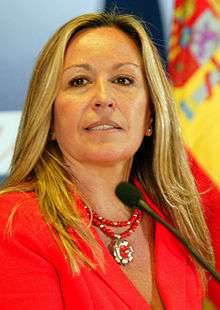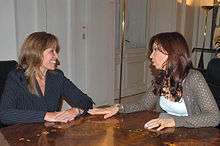Trinidad Jiménez
| Trinidad Jiménez | |
|---|---|
 | |
| Minister of Foreign Affairs and Cooperation | |
|
In office 21 October 2010 – 22 December 2011 | |
| Prime Minister | José Luis Rodríguez Zapatero |
| Preceded by | Miguel Ángel Moratinos |
| Succeeded by | José García-Margallo y Marfil |
| Minister of Health and Social Policy and Equality | |
|
In office 7 April 2009 – 21 Octuber 2010 | |
| Prime Minister | José Luis Rodríguez Zapatero |
| Preceded by | Bernat Soria |
| Succeeded by | Leire Pajín |
| Member of the Congress of Deputies | |
|
In office 13 December 2011 – 12 January 2016 | |
| Constituency | Malaga |
|
In office 1 April 2008 – 22 April 2008 | |
| Constituency | Madrid |
| Personal details | |
| Born |
Trinidad Jiménez García-Herrera 4 June 1962 Málaga, Andalusia, Spain |
| Nationality | Spanish |
| Political party | PSOE |
Trinidad Jiménez García-Herrera (born 4 June 1962) is a Spanish Socialist Workers' Party (PSOE) politician and was Spain's Foreign Affairs Minister. She is widely considered to be a confidante of former Spanish prime ministers Felipe González and José Luis Rodríguez Zapatero.[1]
Early life and education
Born in Málaga on 4 June 1962, the third of nine children, Jiménez has a law degree from the Autonomous University of Madrid.
Career
Jiménez is an international relations specialist by profession. In 1983, while still attending Law Faculty, together with other students, she set up the Socialist Students Association. She joined Juventudes Socialistas de España, Spain’s Socialist Youth and was a member of its International Relations Committee. Jiménez joined the PSOE a year later. Jiménez chaired the International Relations Committee of Spain’s Youth Council and served on its Permanent Committee (1984–1986).
She was the Spanish representative on a North American NATO Youth Exchange Program (1989) and headed the 'New Programs and Development' department of the Spanish delegation of the American Field Service. Jiménez also helped run the Office of the Secretary General of the National Commission for the Fifth Centennial of the Discovery of America.
Between 1990 and 1992, Jiménez lived in Equatorial Guinea, working as a Professor-Tutor in Political Law at the National Distance Education University (UNED) and at the Spanish College in Bata.

From 1996 to July 2000, Jiménez served as the Officer in Charge of Political Relations with America in the PSOE's International Relations Secretariat and, from 1997, as an advisor to ex Prime Minister Felipe González when he was chair of the Socialist International’s Global Progress Commission.[2] She later served as her parliamentary group's spokesperson on foreign affairs.[3]
In 2003 Jiménez was chosen to be PSOE's candidate for the Mayor of Madrid,[4] but prior to the election was called to other duties in a new post in the Foreign Ministry as Spain's Secretary of State for Ibero-America.[5] In March 2008 she was elected to the Spanish Congress representing Madrid but resigned after only a month.
Member of the Spanish Government, 2009–2011
On 7 April 2009, Jiménez was chosen by the Spanish PM to be the Minister of Health and Social Affairs.
At the request of Zapatero, Jiménez stood against a local Socialist politician in a Madrid party election, but suffered a defeat.[6] Shortly after, on 20 October 2010, she was appointed by Zapatero to be the Spanish Minister of Foreign Affairs in a cabinet reshuffle, replacing Miguel Ángel Moratinos.[7] In her capacity as foreign minister, she met with Chinese Vice Premier Li Keqiang during his high-profile visit to Spain in 2011.[8] Also, she led negotiations with the U.S. on cleaning Palomares, Western Europe’s most radioactive site forty-five years after narrowly avoiding nuclear obliteration in a U.S. Air Force accident.[9]
In 2014, Jiménez succeeded Elena Valenciano as her parliamentary group's spokeswoman in the Committee on Foreign Affairs of the Congress of Deputies.[10] In this capacity, she made headlines when she promoted a non-binding motion in 2014 which "urged" the government to recognize a Palestinian state, angering the Israeli government of Prime Minister Benjamin Netanyahu. The Spanish initiative came after lawmakers in Britain and Ireland called for their governments to recognize a Palestinian state.[11]
Political views
Jiménez expressed disagreement with Cardinal Antonio Cañizares Llovera over the latter's contention that abortion was morally worse than pedophilia.[12]
In 2010, Jiménez provoked controversy and scathing criticism from opponents of Venezuelan leader Hugo Chávez when she said that there were no political prisoners in Venezuela.[13]
References
- ↑ Mábel Galaz (April 11, 2013), Trinidad Jiménez: “Nos casamos, estamos muy enamorados” El País.
- ↑ Lecture Series of the Americas
- ↑ Rightist's Showing in French Election Deplored Across Europe New York Times.
- ↑ "Spain's devout first lady to run for office - Europe, News - The Independent". London.
- ↑ Inside Spain 28
- ↑ Raphael Minder (October 20, 2010), Zapatero Shakes Up Spanish Cabinet International Herald Tribune.
- ↑ "Spanish prime minister in major cabinet reshuffle". The Telegraph. London. 20 October 2010. Retrieved 24 August 2013.
- ↑ Jonathan House and David Roman (January 4, 2011), Beijing Signals Interest in Spain Debt Wall Street Journal.
- ↑ Raphael Minder (April 5, 2011), Spain and U.S. Near Accord on Atomic Cleanup International Herald Tribune.
- ↑ Trinidad Jiménez asume la portavocía del PSOE en la comisión de Exteriores El País, September 11, 2014.
- ↑ Julien Toyer, Edgar Aribau, Raquel Castillo and Ori Lewis (November 18, 2014), Spanish parliament to water down Palestine state call Reuters.
- ↑ Vatican_official_criticized_for_downplaying_abuse_in_Ireland_ Vatican official criticized for downplaying abuse in Ireland
- ↑ Benedict Mander (November 5, 2010), Spain uneasy with Venezuela over Eta Financial Times.
External links
| Wikimedia Commons has media related to Trinidad Jiménez. |
| Political offices | ||
|---|---|---|
| Preceded by Alberto Navarro |
Secretary of State for Ibero-america 2006-2009 |
Succeeded by Juan Pablo de Laiglesia |
| Preceded by Bernat Soria |
Minister of Health, Social Policy and Equality 2009-2010 |
Succeeded by Leire Pajín |
| Preceded by Miguel Ángel Moratinos |
Minister of Foreign Affairs and Cooperation 2010-2011 |
Succeeded by José García-Margallo y Marfil |